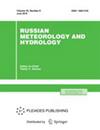使用神经网络学习方法预测水位峰值:德维纳-佩乔拉盆地河流案例研究
IF 0.6
4区 地球科学
Q4 METEOROLOGY & ATMOSPHERIC SCIENCES
引用次数: 0
摘要
摘要 本文以苏霍纳河、北德维纳河和佩乔拉河为例,研究了预测春季流冰期高峰水位的神经网络方法的实施情况。根据俄罗斯水文中心推荐的标准,所有考虑采用的神经网络方法都显示出很高的效率,并且在预测技能方面超过了回归依赖法。在使用人工神经网络训练方法时,预测的标准误差比回归依赖法减少了约 10-20%。本文章由计算机程序翻译,如有差异,请以英文原文为准。

Using the Methods of Neural Network Learning for Peak Water Level Prediction: A Case Study for the Rivers in the Dvina-Pechora Basin
Abstract
The paper examines the implementation of neural network methods for predicting peak water levels during the period of spring ice drift by the example of the Sukhona, Northern Dvina, and Pechora rivers. All considered neural network methods have shown high efficiency according to the criteria recommended by the Hydrometcenter of Russia and surpassed regression dependencies in the skill of forecasts. When using the method of training artificial neural networks, the standard error of prediction is reduced by approximately 10–20% as compared with regression dependencies.
求助全文
通过发布文献求助,成功后即可免费获取论文全文。
去求助
来源期刊

Russian Meteorology and Hydrology
METEOROLOGY & ATMOSPHERIC SCIENCES-
CiteScore
1.70
自引率
28.60%
发文量
44
审稿时长
4-8 weeks
期刊介绍:
Russian Meteorology and Hydrology is a peer reviewed journal that covers topical issues of hydrometeorological science and practice: methods of forecasting weather and hydrological phenomena, climate monitoring issues, environmental pollution, space hydrometeorology, agrometeorology.
 求助内容:
求助内容: 应助结果提醒方式:
应助结果提醒方式:


